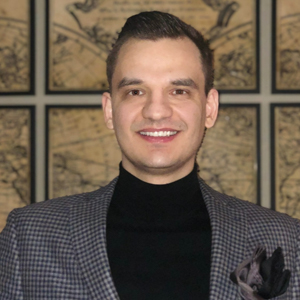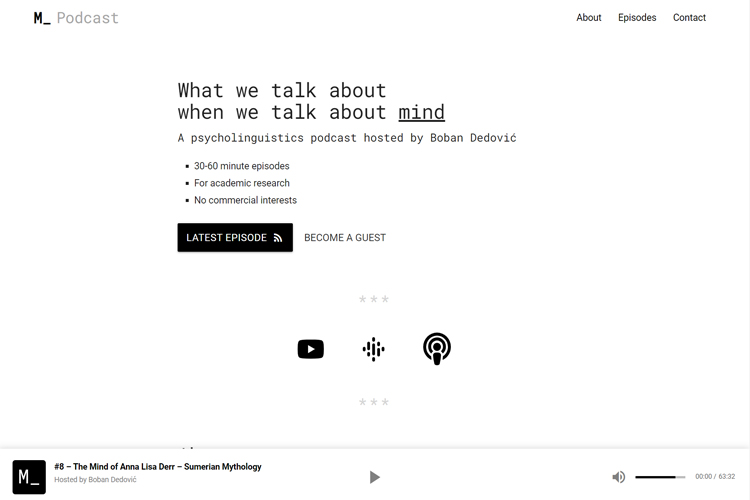Credits
Partial Transcript
Boban Dedović Host
00:11 Hello, I'm Boban Dedović and this is episode five of the "What we talk about when we talk about mind" podcast.
Boban Dedović Host
00:19 I have a very special guest today named Peihan Huo (霍沛翰). He's currently a PhD student at Cornell University and his research is focused on applied mathematics; that is to say, in modeling, game theory, and finance. He graduated with honors from Brown University with a bachelor's degree in applied mathematics as well. He's also a native speaker of one of several Chinese languages and has sufficient command of English language as well. I'm excited to discuss with him what he talks about when he talks about mind.
Boban Dedović Host
00:55 For today's hat, we have a cuneiform symbol that's known in Sumerian as the 𒊮 'ŠAG4/ŠA3' symbol. And as you can see, we have a few wedge shaped marks enclosing a little X, which is also represented by two more wedges. Because this writing system, cuneiform, was used in both Sumerian and Akkadian, among other languages, there's some overlap with the word. As noted in Sumerian, this symbol meant ŠAG/ŠA, which is also translated as "heart," or "mind," or usually "center; midst." In Akkadian, the word is libbum and libbum also means "heart." It comes to be translated as "mind." And it's another one of these thorny ancient language words that we're so interested in. Again, that's the hat of the day–the 𒊮 'ŠAG4/ŠA3' symbol–in both Sumerian and Akkadian cuneiform.
Boban Dedović Host
01:54 And for today's book, we have Your Brain is a Time Machine: The Neuroscience and Physics of Time, by Dean Buonomano. It was published in 2017 and explains all the different, unique ways that your body tracks time and keeps up your homeostasis. The last few chapters are very interesting with respect to language. After all, this book has to be written, and the last few chapters talk a lot about personhood, what it means to perceive time, and how that's explained to other people, versus how it maybe stands with physicists or other trained professionals. And I recommend the book for that reason. That is to say, the last few chapters of the book talk about how time is such an important concept in language, and we have to talk about it in terms of space; and we're very limited by what our language can afford, which, of course, is indicative of the tight relationship between language and psychology. So the book is called Your Brain is a Time Machine: The Neuroscience and Physics of Time, by Dean Buenomano; and I highly recommend it.
Boban Dedović Host
03:05 So tell me a little bit about your linguistic background. What's your native language and how did English come into the fold?
Peihan Huo (霍沛翰) Guest
03:14 So my native language is Mandarin Chinese. The written language is simplified Chinese because in mainland China we have English classes. So it's basically part of the requirements since elementary school. And also it was part of the exam requirements for me personally–middle school and high school. It's still a public school, but the curriculum focus a lot more on English and foreign languages. So some of my classmates, they did like French and Spanish.
Peihan Huo (霍沛翰) Guest
03:47 I just did English, and also I came here to the States for college, so that's how I picked up more English. Conversational English. So now, I've been here for like, six years now. Yeah. And I've been conversing with people in English, and I think I'm pretty fluent in English right now.
Boban Dedović Host
04:11 Yeah, I'd say you're very fluent. I remember when we were having our earlier discussion and I noticed how with your background being in applied mathematics, you're very particular and you're very good about the numbering in your words. And when I say numbering, I mean applying the correct quantities, such as dog–one "dog" versus "dogs" for multiple. For example, I recall you're very specific about saying "maths," "matrix–matrices," "vertex–vertices," so forth.
Boban Dedović Host
04:46 So I think many people would agree that you're much more than fluent in English.
Peihan Huo (霍沛翰) Guest
04:54 Thank you.
Boban Dedović Host
04:55 Your native language is Mandarin Chinese, but the writing system you said is simplified Chinese, correct?
Peihan Huo (霍沛翰) Guest
05:03 Yes.
The rest of this transcript is not quite ready. Check back soon.
Works Referenced
(In order of appearance)
Dean Buonomano, Your Brain Is a Time Machine: The Neuroscience and Physics of Time (New York, NY: W.W. Norton, 2017).
"Google Translate," accessed July 21, 2022, https://translate.google.com.
Transcript Notes

Boban Dedović
Person · Psycholinguist
Boban Dedović (Apr. 8, 1989 –) is a Croatian-American psycholinguist, technologist, scholar of ancient languages, and podcast host. He was born in the former Yugoslavia and moved to the United States at the age of seven. He studied both religions of antiquity (B.A.) and social psychology (B.S.) at University of Maryland in College Park before earning his graduate degree from the University of Chicago... Read more
See also: mindspace.studio bobandedovic.com twitter.com

Mindspace Studio Podcast
Website by Boban Dedović
Mindspace Studio is a psycholinguistics-themed podcast hosted by Boban Dedović, a Croatian-American psycholinguist and technologist. It was started in January of 2021 while Dedović was a graduate researcher at the University of Chicago. The program provides thrity to sixty minute episodes focused on language, psychology, and other related fields of study. It is available on YouTube, Apple Podcasts, and Google Podcasts... Read more
See also: youtube.com podcasts.apple.com podcasts.google.com conscious.ai
Heads up
This page contains a Guided Transcript
Whenever you click on a blue link that contains the panel icon chrome_reader_mode, a knowledge panel will appear on the right side of your device.
These panels provide verified, accurate information about people, books, and other things that are relevant to the discussion. The links take you to relevant websites related to source materials, as shown below:
See also: mindspace.studio
